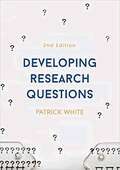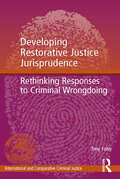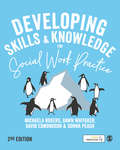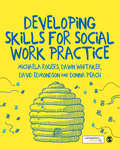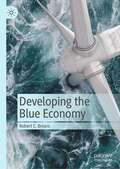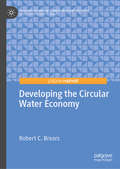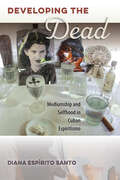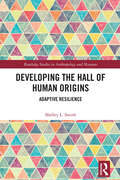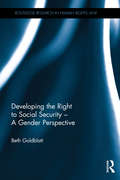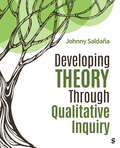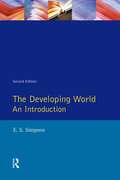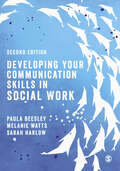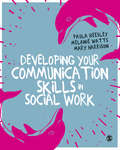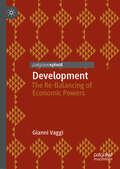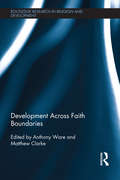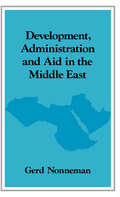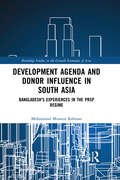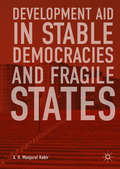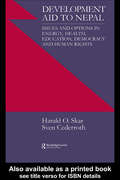- Table View
- List View
Developing Research Questions
by Patrick WhiteThis no fuss, compact guide steers social science students of all levels through the complex process of conducting a research project. It explains how to break down initial ideas and broad topics into manageable questions and gives detailed guidance on how to refine these as the project progresses. With a wide range of international examples and reflective exercises, it is packed with handy tips and examples that show how to avoid common mistakes and pitfalls, and ensure that hypotheses and questions are linked with research design, methods and answers at every step. <p><p> Taking readers from the start through to the final stage of answering their questions and drawing conclusions, this is an indispensable resource for research methods courses. In addition, it is highly recommended for all students undertaking an independent research project or thesis at undergraduate, postgraduate or PhD level and beyond.
Developing Restorative Justice Jurisprudence: Rethinking Responses to Criminal Wrongdoing (International and Comparative Criminal Justice)
by Tony FoleyWhat are the requirements for a just response to criminal wrongdoing? Drawing on comparative and empirical analysis of existing models of global practice, this book offers an approach aimed at restricting the current limitations of criminal justice process and addressing the current deficiencies. Putting restoration squarely alongside other aims of justice responses, the author argues that only when restorative questions are taken into account can institutional responses be truly said to be just. Using the three primary jurisdictions of Australia, New Zealand and Canada, the book presents the leading examples of restorative justice practices incorporated in mainstream criminal justice systems from around the world. In conclusion, the work provides a fresh insight into how today’s criminal law might develop in order to bring restoration directly into the mix for tomorrow. This book will be of interest to undergraduates, postgraduate researchers and lecturers, as well as lawyers who work in the field of criminal law, criminologists, social scientists and philosophers interested in ideas of wrongdoing and criminal justice responses to criminal offending.
Developing Skills and Knowledge for Social Work Practice
by David Edmondson Dawn Whitaker Donna Peach Michaela RogersThis very practical guide will teach students everything they need to know to successfully apply theory, methods and approaches in real-life practice. It will assist in developing and hone their skills to make the best start in their practice placement and beyond as a newly qualified practitioner. To get the most out of this book, visit the companion website at https://www.study.sagepub.com/rogers2e to find journal articles, templates, ‘how to’ guides and brand new videos with discussion questions, and a glossary.
Developing Skills and Knowledge for Social Work Practice
by David Edmondson Dawn Whitaker Donna Peach Michaela RogersThis very practical guide will teach students everything they need to know to successfully apply theory, methods and approaches in real-life practice. It will assist in developing and hone their skills to make the best start in their practice placement and beyond as a newly qualified practitioner. To get the most out of this book, visit the companion website at https://www.study.sagepub.com/rogers2e to find journal articles, templates, ‘how to’ guides and brand new videos with discussion questions, and a glossary.
Developing Skills for Social Work Practice
by David Edmondson Dawn Whitaker Donna Peach Michaela RogersAre your students struggling to get to grips with what social work actually looks like in real-life practice? Are they wanting to know more about how they can develop the right skills and implement the right theory in many different practice situations? Then you have come to the right place! This book will provide your students with everything they need to know and more, helping them develop and hone their skills and make the best start in their practice placements. To get the most out of this book and access more materials to support them through their social work degree, visit the companion website at https://www.study.sagepub.com/rogers to read journal articles, access 'how to..' guides and helpful links, as well as hear first-hand from frontline social workers, services users, carers and more.
Developing Skills for Social Work Practice
by Michaela Rogers Dawn Whitaker David Edmondson Donna PeachAre your students struggling to get to grips with what social work actually looks like in real-life practice? Are they wanting to know more about how they can develop the right skills and implement the right theory in many different practice situations? Then you have come to the right place! This book will provide your students with everything they need to know and more, helping them develop and hone their skills and make the best start in their practice placements. To get the most out of this book and access more materials to support them through their social work degree, visit the companion website at https://www.study.sagepub.com/rogers to read journal articles, access ‘how to..’ guides and helpful links, as well as hear first-hand from frontline social workers, services users, carers and more.
Developing the Blue Economy
by Robert C. BrearsTraditionally, the ocean economy is viewed solely as a mechanism for economic growth. In this business-as-usual approach, large-scale industrial economies have developed the ocean economy through the exploitation of maritime and marine resources, often without consideration of how those activities impact the future health or productivity of those same resources. This has led to aquatic ecosystems being viewed and treated as limitless resources; the marine environment becoming a dumping ground for waste; overfishing diminishing fishing stocks; ocean habitats being degraded from coastal developments; sea-level rise impacting coastal communities and infrastructure; increasing ocean acidification; and the marginalisation of poor coastal communities.Recognising the failings of the traditional ocean economy, there is a transition underway around the world towards the Blue Economy. This concept moves beyond the business-as-usual approach with economic development and ocean health complementary to one another. In the Blue Economy, the environmental risks of and ecological degradation from economic activity are mitigated or significantly reduced. Therefore, economic activity is in balance with the long-term capacity of the ocean ecosystems to support this activity and remain healthy and resilient. This book will provide an overview of the various technologies used to promote cross-sectoral and multi-scalar collaboration, facilitate the integrated management of sectors and resources, foster partnerships between governments and industry, encourage R&D in new technologies in resource use and management, and scale-up innovative financing mechanisms in the development of a Blue Economy. Also, the book will contain in-depth case studies that illustrate how locations, of differing climates, lifestyles and income levels, have implemented technologies to facilitate the development of the Blue Economy.Developing the Blue Economy will provide an accessible resource for practitioners and researchers working in the field on the various innovative technologies being implemented around the world to create a Blue Economy.
Developing the Circular Water Economy (Palgrave Studies in Climate Resilient Societies)
by Robert C. BrearsThis book presents new research on policy innovations that promote the development of the circular water economy. In contrast to the linear economy, the circular water economy promotes the reduction of water consumption, reuse of water, and recovery of resources from wastewater to not only increase resilience to climate change but also to reduce greenhouse gas emissions resulting from the provision of water and wastewater-related services. Providing a series of in-depth case studies of important locations in differing climates around the globe that have implemented a variety of policy innovations to develop the circular water economy, this book is a valuable resource for water and resource conservation managers, policymakers, international companies and organisations interested in the circular economy, environmental NGOs, researchers, as well as graduate and undergraduate students. · Systematically reviews policy innovations to develop the circular water economy· Illustrates how leading locations from around the world have developed the circular water economy to increase resilience to climate change while reducing emissions · Provides ‘best practices’ for other locations around the world aiming to implement the circular water economy
Developing the Dead: Mediumship and Selfhood in Cuban Espiritismo
by Diana Espírito SantoBased on extensive fieldwork among espiritistas and their patrons in Havana, this book makes the surprising claim that Spiritist practices are fundamentally a project of developing the self. When mediums cultivate relationships between the living and the dead, argues Diana Espírito Santo, they develop, learn, sense, dream, and connect to multiple spirits (muertos), expanding the borders of the self. This understanding of selfhood is radically different from Enlightenment ideas of an autonomous, bounded self and holds fascinating implications for prophecy, healing, and self-consciousness. Developing the Dead shows how Espiritismo’s self-making process permeates all aspects of life, not only for its own practitioners but also for those of other Afro-Cuban religions.
Developing the Hall of Human Origins: Adaptive Resilience (Routledge Studies in Anthropology and Museums)
by Shelley L. SmithThis book focuses on the development of the National Museum of Natural History’s David H. Koch Hall of Human Origins. As one of the most visited human evolution exhibits in the world and the largest such exhibit in the United States, it has tremendous influence on public perception and knowledge of human evolution. The chapters explore how this exhibit came about, how it has changed since opening, and the associated educational and public outreach activities of members of the Smithsonian’s Human Origins Program. The author uses the term “adaptive resilience” to describe a central theme of the exhibit, our species’ adaptation to changing environments as a key feature of our success, and to refer to the resilience of Richard B. Potts in creating his vision for the hall. Contextual sections situate the hall’s development within the history of paleoanthropology, the politics of evolution and climate change, and African contributions. The book will be of particular interest to scholars of anthropology and museum studies as well as the history of science and science communication.
Developing the Right to Social Security - A Gender Perspective: A Gender Perspective (Routledge Research in Human Rights Law)
by Beth GoldblattThe right to social security, found in international law and in the constitutions of many nations, contributes to the alleviation of poverty globally. Social security and its articulation as a human right have received increased attention in recent years both in response to austerity cuts to welfare in developed countries and as a means of lifting millions out of poverty in developing countries. Women, disproportionately affected by poverty in all parts of the world, stand to gain from a right to social security that takes cognisance of gender discrimination and disadvantage. This book interprets and redefines the right to social security from a gender perspective. Drawing on feminist theory, the book formulates a conceptual approach and a set of principles for a substantively equal, gendered right to social security. In so doing, it challenges the relationship between the right to social security and traditional conceptions of work that exclude women’s labour including their caring roles. It argues that the right must have application at the transnational level if it is to address the changing nature of women’s work due to globalisation. The book applies the framework and principles it develops to a study of international law focusing on the work of key United Nations human rights bodies. It also demonstrates the value of this framework in its analysis of three countries’ social security programmes - South Africa, Australia and India. In combining feminist thought on the nature of work and care with equality theories in developing the right to social security from a gender perspective this book expands the capacity of the right to advance gender equality and address gendered poverty.
Developing Theory Through Qualitative Inquiry
by Johnny SaldañaThis unique text shows researchers how to develop theories derived through qualitative inquiry. Johnny Saldaña illustrates how a theory is a research-based statement with an accompanying explicating narrative that contains six properties: concepts, propositional logic, parameters/variation, explanation/causation, generalizability/transferability, and the improvement of social life. The book features hundreds of examples of theories and metatheories from a wide range of disciplines and includes end-of-chapter activities for exercising the skills necessary to develop original theories. Just as Saldaña demystifies coding and qualitative data analysis in his bestselling Sage books, Developing Theory Through Qualitative Inquiry presents an accessible introduction to the principles and methods of theorizing for social insight.
Developing Theory Through Qualitative Inquiry
by Johnny SaldañaThis unique text shows researchers how to develop theories derived through qualitative inquiry. Johnny Saldaña illustrates how a theory is a research-based statement with an accompanying explicating narrative that contains six properties: concepts, propositional logic, parameters/variation, explanation/causation, generalizability/transferability, and the improvement of social life. The book features hundreds of examples of theories and metatheories from a wide range of disciplines and includes end-of-chapter activities for exercising the skills necessary to develop original theories. Just as Saldaña demystifies coding and qualitative data analysis in his bestselling Sage books, Developing Theory Through Qualitative Inquiry presents an accessible introduction to the principles and methods of theorizing for social insight.
Developing World, The: An Introduction
by E. S. SimpsonAddresses the issues faced by developing nations in attempting to secure sustainable economic development.
Developing Your Communication Skills in Social Work
by Paula Beesley Melanie Watts Sarah HarlowThis book explores: · What is meant by communication skills · What communication skills are · What they look like in practice · The differences in communicating with service users and professionals, such as children, guardians, peers and emergency workers · Why they are important It includes a wide range of theories, multiple case studies, reflective tasks, and exercises. It will develop your critical thinking and reflection skills, and help you develop your own communication style. Presented in a chronological style which acts as a working tool that you can dip into and out of. Each chapter is structured in a way that encourages you to build on your knowledge, so it begins by taking you right back to basics to learn core theory and practice techniques before getting you to critically reflect on the use of different skills in different settings and with different service user groups. The end-of-chapter skills audits help you to reflect on what you have learnt, what your strengths are and what you need to work on more.
Developing Your Communication Skills in Social Work
by Paula Beesley Melanie Watts Sarah HarlowThis book explores: · What is meant by communication skills · What communication skills are · What they look like in practice · The differences in communicating with service users and professionals, such as children, guardians, peers and emergency workers · Why they are important It includes a wide range of theories, multiple case studies, reflective tasks, and exercises. It will develop your critical thinking and reflection skills, and help you develop your own communication style. Presented in a chronological style which acts as a working tool that you can dip into and out of. Each chapter is structured in a way that encourages you to build on your knowledge, so it begins by taking you right back to basics to learn core theory and practice techniques before getting you to critically reflect on the use of different skills in different settings and with different service user groups. The end-of-chapter skills audits help you to reflect on what you have learnt, what your strengths are and what you need to work on more.
Developing Your Communication Skills in Social Work
by Paula Beesley Melanie Watts Mary HarrisonWhat is communication and why is it important? Our ability to communicate is central to everyday life and an essential skill in social work. This easy-to-read book offers a step-by-step guide to developing effective communication skills with a diverse range of service users and professionals. It is the perfect guide to help manage different communication skills in different settings, and more importantly, encourage students to continually reflect and develop these skills. Key features: - Wide range of case studies from an array of service areas and user groups - Reflective tasks and questions to stimulate critical thinking and discussion - Skills audits to test where your strengths are and areas for development This book is designed to guide readers in developing their own communication style that best suits them to become an effective social worker, whilst meeting the needs of their service user group and individual service user.
Developing Your Communication Skills in Social Work
by Paula Beesley Melanie Watts Mary HarrisonWhat is communication and why is it important? Our ability to communicate is central to everyday life and an essential skill in social work. This easy-to-read book offers a step-by-step guide to developing effective communication skills with a diverse range of service users and professionals. It is the perfect guide to help manage different communication skills in different settings, and more importantly, encourage students to continually reflect and develop these skills. Key features: - Wide range of case studies from an array of service areas and user groups - Reflective tasks and questions to stimulate critical thinking and discussion - Skills audits to test where your strengths are and areas for development This book is designed to guide readers in developing their own communication style that best suits them to become an effective social worker, whilst meeting the needs of their service user group and individual service user.
Development: The Re-Balancing of Economic Powers (Routledge Studies In The History Of Economics Ser. #Vol. 78)
by Gianni VaggiThis book provides a brief history of the notion of development and related policies. Readers will find an overview of the main development notions and debates from 1950 to the 2015 Sustainable Development Goals. The author argues that sustainable development is equal to empowerment within a specific historical setting; development is a dialectic relationship between people's empowerment and the existing social and economic structures. The book examines some well-known growth theories from Harrod in 1939 to contemporary debates views about the role of the state and the market. Some major structural changes are also examined from economic growth in Asia to international finance: the author contends that contemporary issues on development can be better understood with the help of the founding fathers of economics, from the Mercantilist era to Marx. They help to understand the difficult relationship between development and market forces within different models of social and economic reproduction. The author contends that the main development challenge is that of building a global partnership in a system with enormous differences in economic powers and offers some examples of how to re-balance the existing economic powers particularly in trade and finance.
Development Across Faith Boundaries (Routledge Research in Religion and Development)
by Anthony Ware and Matthew ClarkeFaith-based organisations (FBOs) have long been recognised as having an advantage in delivering programs and interventions amongst communities of the same faith. However, many FBOs today work across a variety of contexts, including with local partners and communities of different faiths. Likewise, secular NGOs and donors are increasingly partnering with faith-based organisations to work in highly-religious communities. Development Across Faith Boundaries explores the dynamics of activities by local or international FBOs that cross faith boundaries, whether with their partners, donors or recipient communities. The book investigates the dynamics of cross-faith partnerships in a range of development contexts, from India, Cambodia and Myanmar, to Melanesia, Bosnia, Ethiopia and Afghanistan. The book demonstrates how far FBOs extend their activities beyond their own faith communities and how far NGOs partner with religious actors. It also considers the impacts of these cross-faith partnerships, including their work on conflict and sectarian or ethnic tension in the relevant communities. This book is an invaluable guide for graduates, researchers and students with an interest in development and religious studies, as well as practitioners within the aid sector.
Development, Administration and Aid in the Middle East
by Gerd NonnemanSuccessful development in the Middle East remains elusive, although considerable aid is poured into the region and extensive bureaucracies for managing development have been established. This book is a concise political economy of Middle Eastern development and its administration. A major focus is the nature and role of State and bureaucracy. Special attention is also paid to the relation between aid and development. In addition to providing an analytical framework, this book brings together a wealth of up-to-date information in an easily accessible format about the region's economic development and the structure of the countries' development 'machinery'. Extensive original research in the area, combined with a balanced use of Western and Arabic sources allow the author to present the most comprehensive overview of the subject available yet. The book encompasses most of the Arab countries plus Ethiopia. The Arab donors are also examined in detail. Especially valuable and not elsewhere available are the numerous organisational charts depicting the individual countries' development administrations and the Arab donors' aid administrations. This book will be of interest to all students of Middle East politics, economics and administration as well as to students of development.
Development Agenda and Donor Influence in South Asia: Bangladesh's Experiences in the PRSP Regime (Routledge Studies in the Growth Economies of Asia)
by Mohammad Mizanur RahmanPolicy ownership of development agenda emerged as an important aspect in international development cooperation during the 1990s in the wake of evident failures of reform initiatives in developing countries steered by donor agencies, particularly the international financial institutions (IFIs), the World Bank (WB) and the International Monetary Fund (IMF). The principal focus of this book is to examine Bangladesh’s policy ownership in its PRSP by broadly analyzing the dynamics in the formulation process and examining the principal actors’ contribution to the formulation process. This book also deals with several other dimensions of foreign aid and its changing features including the shifts in WB-IMF’s approach to development cooperation. This book argues that the WB-IMF strongly influence Bangladesh’s development strategies and agendas and in general the WB-IMF have not changed much in their aid relationship despite clear limitations of their previous reform models. Building on Bangladesh’s current level of development the book advocates that Bangladesh needs to adopt a new model for development agenda setting. Illustrating the influences of donor communities on the creation of development strategies in developing countries, this book presents a macro dynamics of the political economy of international development cooperation. It will be of interest to academics and professionals working on political economy, governance, public policy and development cooperation as well as South Asian Studies.
Development Aid and Economic Growth: A Positive Long-Run Relation
by Camelia Minoiu Sanjay G. ReddyA report from the International Monetary Fund.
Development Aid in Stable Democracies and Fragile States
by A. H. KabirThis book is based on experience and reflections related to international support provided to parliaments and legislative bodies both in selected countries (Afghanistan, Bangladesh, Ghana, Serbia, and Kyrgyzstan) and globally. The author intends to provide a critique of parliamentary support, as part of development assistance or foreign aid, for having been conceived in narrow terms of technical assistance and for failing to appreciate that aid effectiveness calls for a sound understanding of a country’s politics, culture, and history. The monograph examines the effectiveness of aid in both stable democracies, and fragile and transition countries. The project is ideal for audiences interested in regional politics, the Middle East, Africa, South Asia, Central Asia, and development/democracy studies.
Development Aid to Nepal: Issues and Options in Energy, Health, Education, Democracy and Human Rights (Nias Reports #No.35)
by Sven Cederoth Cederroth Harald O. SkarrAn ongoing challenge for Western aid projects in the Third World is that all too often results do not meet expectations. Determined to address this issue at the outset before committing greater sums to its aid to Nepal, in 1996 the Norwegian Foreign Ministry commissioned an extensive analysis of development needs and concrete aid achievements for that country. Now substantially reworked and expanded with data not previously available to international scholars, this study of the energy, health and education sectors in Nepal - as well as the situation there of democracy and human rights - will be of especial interest to researchers and NGOs working in the area.
